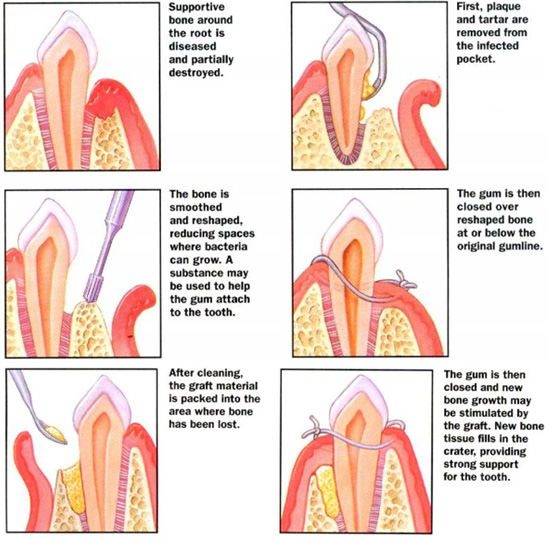Periodontal Surgery

If there is extensive bone loss with deep periodontal pockets that prevents thorough cleaning of the roots of the teeth, then periodontal flap surgery, sometimes called pocket reduction surgery is indicated. This is a procedure that gives direct access to the roots of the teeth for visualization of diseased root surfaces and for removal of diseased and infected tissue. During the pocket reduction procedure, your periodontist folds back the gum tissue and removes the disease-causing bacteria plaque and tartar from the root surfaces of the teeth. Once the teeth and roots are clean, he/she will secure the tissue back into place. In some cases, irregular surfaces and sharp edges of the damaged bone are smoothed to limit areas where disease-causing bacteria can hide. It also allows the gum tissue to reattach better to healthy bone.
It there is extensive bone loss, then bone grafting or guided tissue regeneration might be recommended. This is a procedure that allows for grafting of bone to regenerate lost tissue. We are lucky now to have available techniques and materials that increase the healing capacity of our tissue to regenerate what was lost.
Tiny fragments of your own bone, synthetic bone, or bone from a bone bank are placed where bone was lost. These grafts serve as a platform for the regrowth of bone. This restores stability to your teeth.
Common Questions
Will it hurt?
You should feel little or no discomfort during the procedure. Your periodontist will use an anesthetic to numb the surgical area. There are many techniques available for relieving anxiety during surgery. You can speak to your periodontist about these options. Following surgery, the affected area will be tender or sore. Swelling of the surgical area may occur. The doctor will prescribe medications to relive post-surgical discomfort. Antibiotics or antibacterial rinses also may be prescribed. If you take medications as directed and follow your periodontist's instructions you probably will experience only minor discomfort. Most patients resume their normal routines the day after surgery.
Will I be able to speak and eat normally after surgery?
You should be able to speak normally after the anesthetic has worn off. It is important to eat a well-balanced, nutritious diet after surgery. You may need to avoid chewing some foods in the surgical area for a few days.
Following some types of periodontal surgery, the teeth may be more sensitive to hot and cold. This will diminish considerably during the first few weeks after surgery.
When will I need to return to my periodontist?
Usually patients return for post-surgical treatment in five to ten days. At this time, it may be necessary to remove any stitches and cleanse the surgical area.
Will I ever need surgery again?
In most instances you will not need surgery in the same area again. However, in certain cases, re-treatment or additional surgery may be needed. As you have learned, you may be prone to periodontal disease. Periodontal disease is a chronic disease that requires constant and careful attention. Like other chronic diseases, such as diabetes, hypertension and asthma, there is no cure. Periodontal surgery helps control the disease and prevents further destruction to the gums and bone, thereby minimizing tooth loss.
What can I do to help control the disease?
Periodontal disease can and will recur if you do not follow a strict program of supportive periodontal therapy. You play the major role in preventing further destruction of the disease.
Nothing will help you maintain the results of professional treatment better than daily removal of plaque by proper brushing, flossing and other cleaning methods recommended for you.
There are many benefits to safeguarding your periodontal health. By retaining your natural teeth, you can chew more comfortably and enjoy better digestion. You also keep a healthy smile which is a natural asset to your appearance. For feeling good and looking good, nothing works better than your natural teeth. When your efforts are combined with regular visits to your dentist and periodontist, you have an excellent chance of keeping your teeth for a lifetime.
